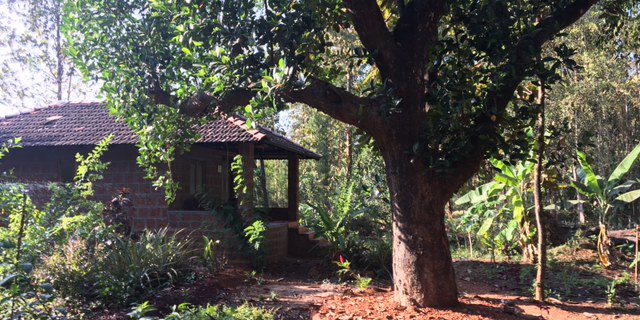I had an extraordinary time visiting a real Indian farm in Southeastern Goa. Dudhsagar Plantation is a guesthouse spread on about 50 beautiful acres. They have 5 cottages scattered amongst the agricultural paradise and employ around 14 people. The farm is owned by Doris and Ajit Malkarnekar who started it over 30 years ago. Doris is from Germany and still lives there. Ajit is Goan. Their son, Ashok, was my host. His wife actually lives in Indonesia. I found it fascinating that both couples are international and live apart most of the time. I guess when running a large plantation, you do what you have to in order to keep the place running smoothly. In fact, I’ve met many people in India that live apart from their spouses in order to meet obligations of extended family and work. It’s not terribly uncommon.
Accommodations
Beside the 5 cottages, the grounds also have a fair sized swimming pool and open air common dining room. It has a thatched roof and is situated just outside the main house. The food was delicious and featured many of their farm grown fruits, vegetables and spices.

Their organic vegetable garden
The tour
Ashok gave me the grand tour and I was captivated by every amazing detail. Their main crop is coconuts and they harvest 3 to 4 times per year. They cook with their own homemade bio gas, which is basically methane made from liquefied cow dung. Cow dung is a popular fuel in India. Traditionally, many homes dry cow dung discs and cook with them year around. Sometimes it takes a little getting used to because the smell of burning cow dung mixes with the aroma of the food and is a little pungent for western senses, but food cooked on biogas does not have this odour.
Cashew Feni
They also make their own cashew feni. It is booze made from the fruit of the cashew tree, not the cashew nuts. The juice from the cashew fruit is fermented for 2 to 3 days to get the urak, which is the lower proof version of feni. I actually prefer urak to the feni because it’s not as strong, only about 40% alcohol. A good feni is normally around 55% alcohol. Urak is distilled a second time to turn it into feni. Ashok said that licenses to distill feni are auctioned off to the highest bidder,and these rights are then shared among the local farmers. A bottle of feni is a popular souvenir from Goa.

Ashok and the cashew feni distillery
Exotic plants everywhere
The rest of the tour was just as fascinating. I saw many plants I had never seen before, and may never see again. He showed me a cinnamon tree, cardamom bush, and allspice plant, all of which smelled like Christmas. I also saw vanilla orchids and black peppercorn, both of which grow as a vine up the trunk of palm trees. I tasted fresh curry leaves and turmeric. They are important foundation spices of the Indian diet. While walking through the plantation we came across one of his workers harvesting betel nut. Betel nut is a nut that when chewed with lime produces a red substance that is popular with both men and women. Often it is mixed with some tobacco and the combination produces a sort of buzz to the consumer and is addictive. I also saw guava trees, jack fruit, starfruit, banana, chikoo and passion fruit vines. Every twist and turn of our walk brought another fascinating plant to look at.

Worker harvesting betel nut
Farmstay holidays and work trade
The cottages at Dudhsagar Plantation are nice and private and can be booked online at www.dudhsagarplantation.com. They also trade free accommodation for help on the farm as part of a workstay program. It’s an extraordinary place and a botanical delight! I’m so glad I visited and encourage you to do the same.








Wow. This looks like a truly fascinating place to visit. What a great way to experience a bit of the “real” India. This going on my travel wish list. Thanks for the travel tip, Beth.